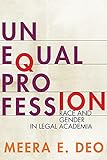Unequal profession : race and gender in legal academia / Meera E. Deo.
Publisher: Stanford, California : Stanford University Press, [2019]Description: xiv, 235 pages ; 24 cmContent type:- text
- 9781503607842
- 340.071 23
- KF272 .D47 2019
| Item type | Current library | Shelving location | Call number | Materials specified | Status | Notes | Barcode | |
|---|---|---|---|---|---|---|---|---|
 BOOKs
BOOKs
|
National Law School | General Stacks | 340.071 DEO (Browse shelf(Opens below)) | PB | Available | Recommended by Dr. Atreyee Majumder for DASRA Project | 40071 |
Browsing National Law School shelves,Shelving location: General Stacks Close shelf browser (Hides shelf browser)
| No cover image available |

|
No cover image available |

|

|

|

|
||
| 340.07 WIL-1 Learning the law | 340.07 WIL-1 Learning The Law | 340.07 WIL-3 Learning the law | 340.071 DEO Unequal profession : race and gender in legal academia / | 340.071 LLE-2 The bremable bush : The classic lectures on the law and law school | 340.071 MAD-3 An idea of a law school ideas from the law school : | 340.0711 KAU How to account for trauma and emotions in law teaching / |
Includes bibliographical references (pages 189-227) and index.
Introduction : investigating raceXgender in legal academia -- Barriers to entry -- Ugly truths behind the mask of collegiality -- Connections and confrontations with students -- Tenure and promotion challenges -- Leading the charge -- In pursuit of work/life balance -- Conclusion : support, strategies, and solutions.
This book is the first formal, empirical investigation into the law faculty experience using a distinctly intersectional lens, examining both the personal and professional lives of law faculty members. Comparing the professional and personal experiences of women of color professors with white women, white men, and men of color faculty from assistant professor through dean emeritus, Unequal Profession explores how the race and gender of individual legal academics affects not only their individual and collective experience, but also legal education as a whole. Drawing on quantitative and qualitative empirical data, Meera E. Deo reveals how race and gender intersect to create profound implications for women of color law faculty members, presenting unique challenges as well as opportunities to improve educational and professional outcomes in legal education. Deo shares the powerful stories of law faculty who find themselves confronting intersectional discrimination and implicit bias in the form of silencing, mansplaining, and the presumption of incompetence, to name a few. Through hiring, teaching, colleague interaction, and tenure and promotion, Deo brings the experiences of diverse faculty to life and proposes a number of mechanisms to increase diversity within legal academia and to improve the experience of all faculty members
There are no comments on this title.
